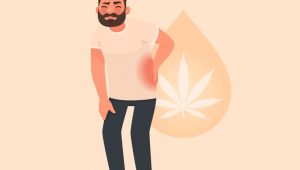Millions of employees in all kinds of industries are facing new issues regarding drug testing at the workplace. Many workers can unintentionally fail drug tests for cannabis even if they are only using CBD (cannabidiol) for different medical conditions such as pain, anxiety, sleeplessness, etc.
The co-director of California NORM, Dale Gieringer, has stated that they are aware of a few incidents where some CBD users have failed the drug test.
In a urinalysis test, the most common workplace drug test, employers do not test for CBD because it is a general perception that CBD does not impair judgment or motor skills. Instead, workers fail drug testing for THC, the psychoactive cannabinoid in marijuana, which may be present in a small amount in a few CBD products and can remain in the human body for a long time.
The label of a CBD product might misrepresent the THC amount; however, it depends on where you are shopping. The state-licensed medical cannabis stores are regulated and require product testing, but the CBD product quality can differ outside these systems, mostly in the unregulated market.
Senior director of Quest Diagnostics, the nation’s largest drug testing company, Barry Sample, said, “It’s caveat emptor. The main issue is, how do you believe the labeling?”
Moreover, if you consume an adequate amount of CBD, then only the residual THC could result in a failed drug test. It is a cause of concern because failing a drug test can result in the loss of both jobs as well as income. It can also result in individuals losing access to some very essential resources such as education benefits, child custody, welfare benefits, and prescriptions for pain killers.
Can you fail a drug test due to CBD?
You will not fail the drug test for CBD; however, the small amount of THC that remains in the CBD oil could cause you to fail. Barry Sample said Quest Diagnostics does not test for CBD. However, they do test for THC.
Here’s the process of drug tests in a brief. Employers collect the samples, mainly urine, and send these samples to various drug testing companies. These companies run these samples through a machine to determine trace chemicals in the liquid. Generally, the technicians look for any proof of a THC’s byproduct, the main component in cannabis. In rare cases, some employers may test saliva, blood, or hair from their employees.
There is one essential guideline in the rules of drug-testing for federal employees. If the urine sample of a federal employee tests positive for some trace amount of the THC metabolite, then he will fail the test. The trace, in this case, means 50 ng/ml, i.e., 50 billionths of a gram/milliliter of urine.
The most common reason why most workers fail the drug test is THC. In 2018, approximately 2.3% of drug tests of Americans for cannabis use came back positive.
Appealing a false positive
A traditional but not uncommon analytical testing method may wrongly classify THC in a sample containing only CBD. According to the estimates of a reporter Amanda Chicago-Lewis, more than ten thousand false positives might arise from the error per year. But, there is some consolation, many CBD users have successfully challenged a failed THC drug test if the lab used this analytical method for testing, which might have led to a wrong report of CBD as THC.
Why is there THC in the CBD oil?
Both THC and CBD are extracts of the cannabis plant. There are very close similarities between medical cannabis and industrial hemp – both produce more than a dozen of similar compounds, the cannabinoids.
CBD from the federally legal hemp contains up to 0.3% THC. Ingesting high doses of CBD, around thousands of mg’s daily, from this federally legal hemp means you might be ingesting a minimum of 1 mg of THC also.
The makers of the famous Prana Hemp and Prana Medicinals and its chief science officer at Colorado’s United Cannabis, Greg Gerdeman, said, “You could test positive for THC if you are liberal with the usage of hemp CBD oil.”
The co-founder of Project CBD, Martin Lee, said that sometimes there are wrong labels too. There is not any existence of mandatory oversight outside the state-licensed marketplace.
Lee said, “Mislabeled CBD products reproduce significantly outside the state-licensed marketplace. He also said, “Although some products are labeled as ‘THC-free,’ they might not be ‘THC-free.’ If any CBD user tests positive for THC, then it might be because either the ‘THC-free’ product had some THC or the test result is inaccurate.
Always use state-licensed CBD products to avoid any accidental THC exposure. Generally, the CBD products have accurate labels and are thoroughly tested, depending on the state. If the products label states no THC, then usually it is true.
How much CBD oil can fail a drug test?
Once again, it is not the CBD. But failing a drug test for THC because you consumed CBD depends on your CBD’s source, how much you consumed, for how long, your metabolism, along with some other factors such as your hydration levels.
Consider the source of CBD oil
An original isolate of the CBD molecule should not consist of any THC. However, these isolates are the extracts of hemp oil and are of fluctuating quality. Legally, the federally legal hemp oil cannot have more than 0.3% THC in it. But in some cases, due to variations in test results, the number can be a bit higher.
Other factors
Apart from your source of CBD, the duration of usage, dosage, personal chemistry, and some other factors decide the success or failure of your drug test.
On one side, someone smoking high-THC cannabis daily and then quitting for a month can still fail a drug test, even a month later. The reason being THC is stored in the fat cells by the human body and later burns the THC into THC-COOH, Sample said.
On the other side, you might never flunk a test for THC-COOH even after consuming a small amount (50 mg/day) of CBD hemp oil for months. However, it is still not clear the amount and duration of CBD hemp oil required to reach more than 50 ng/ml of THC-COOH in the urine. But taking a large amount of CBD could undoubtedly result in testing positive for THC, depending on the source.
According to Sample, whenever THC enters your body, there is a strong possibility of fat cells storing it and then slowly releasing it.
How to pass a CBD drug test
You will be tested for THC, not for CBD. In case you have any reason for concern, you may check out the detoxification guidelines for THC, along with stop using, exercising, dieting, and staying hydrated enough so that there is not any trace of THC in your system.
For how long can CBD stay in the system?
The effects of CBD last from an hour to a few hours, depending on your consumption. In a matter of hours, the human body can turn CBD into CBD-COOH, which sticks around for many days. However, it is not a matter of concern because no employer, as of now, is testing for CBD-COOH.
Can CBD show up in a mouth swab?
Again, the mouth swabs also do not check for CBD. They are looking for THC, said Sample. So, the answer is again no; there are no chances of CBD showing in mouth swab for a drug test at the workplace. But THC will show up nevertheless, so try to keep off large doses of CBD having trace levels of THC.
Can CBD show up in hair follicles?
The standard hair follicle tests at workplaces are for checking THC-COOH, not for checking CBD. So, the answer is no; there is no chance of CBD showing up on a standard hair follicle test at workplaces. But THC will show up. There are chances that the CBD you consumed contained trace levels of THC, leaving THC byproducts in your hair follicle, where there is a possibility of them sticking around for a while. Depending on the hair’s length, the hair follicles can contain a monthly record of drug use.
Can stomach acid turn CBD into THC?
Some rumors are going on that CBD can be converted into THC by stomach acid. According to our experts, it is possible but highly unlikely.
The wholesale manufacturer and seller of CBD isolate, Gerdeman at United Cannabis, emphasized that many CBD water marketers have supported this claim so that they can sell CBD water.
Numerous human trials of a hefty dose of oral CBD have never shown any signs of THC in the test subject’s blood plasma. So, if it is happening outside the lab beaker, no one has ever proved it.
At-home CBD drug testing kits
We are not aware of any at-home testing kits for CBD, or why would even you take one. However, if you have any concern about testing positive for a drug test at your workplace, then you can take an at-home test for THC-COOH, although there may be some inaccuracy among these products.
What’s the future of CBD drug testing?
The trend is shifting towards the minimum drug testing involving non-safety jobs. The number of states ending prejudice against the use of THC is growing. Even some federal bills such as the MORE Act are also following suit.


